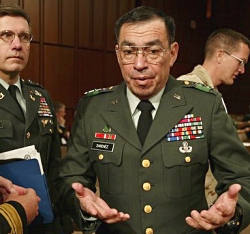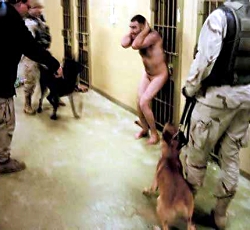Interrogator Says He Instructed Prison Guards
By Leon Worden
Signal City Editor
Wednesday, June 16, 2004
| A |
He also identified John B. Israel, an Iraqi-American translator from Canyon Country, as a member of his three-person interrogation team.
The signed testimony of Steven A. Stefanowicz constitutes some of the most damning evidence yet to support prison guards' claims that they acted on instructions from intelligence personnel at Abu Ghraib.
Stefanowicz's statement, which he signed Jan. 22, three days after Maj. Gen. Antonio Taguba was appointed to investigate reports of prisoner abuse, was leaked Monday to The Associated Press.
Taguba alleged in his March 9 report that Stefanowicz made false statements about his role in abusive interrogations and "clearly knew his instructions equated to physical abuse." Taguba determined that Stefanowicz, Israel and two top Army intelligence officers at the prison, Col. Thomas M. Pappas and Lt. Col. Steve L. Jordan, were "either directly or indirectly responsible for the abuses at Abu Ghraib."
In his sworn statement, Stefanowicz described what he called a typical 72-hour "sleep-meal management program" in which detainees were "provided with 4 hours of sleep" every 24 hours. The four hours may not necessarily have been consecutive.
Stefanowicz testified that the military police guards were responsible for carrying out the interrogators' written and verbal instructions.
Portions of his testimony follow. Grammar is unaltered and "SMMS" refers to the 72-hour sleep and meal deprivation program.
"During a typical SMMS, the MP's are responsible for administering the written program provided by the interrogator. A copy of the detailed, written program that they receive and keep on record in the office, during the duration of the session.
"In all cases, the NCO managing the alpha wing or responsible for the section are verbally briefed about the program, the details of the program, the detainee and intelligence value of the detainee (background).
 Lt. Gen. Ricardo Sanchez told Senators in May that he didn't authorize the use of improper interrogation techniques at Abu Ghraib. On Tuesday the Pentagon said Sanchez will be replaced as the commander of U.S. ground forces in Iraq following the June 30 transfer of power to the new Iraqi government. AP/Evan Vucci |
Stephanowicz testified that a sleep-meal deprivation program "can be divided in any configuration and needs to be written out in detail for each day and approved through the appropriate chain of command," which went from the officer in charge to the brigade commander — Pappas — and in some cases to the JAG officer, a military attorney.
When an interrogator would request "an interrogation plan outside the approved Interrogation Rules of Engagement," Stephanowicz said, it had to go to Pappas and the JAG officer, although "in some circumstance (sic), this approval must go up to the office of General Sanchez for direct approval."
Lt. Gen. Ricardo Sanchez, commander of U.S. ground forces in Iraq, testified to the Senate Armed Services Committee on May 19 that he never saw and didn't authorize the special interrogation rules that had gone into effect at Abu Ghraib in October.
Sanchez said the special interrogation rules, which contravene Geneva convention protections, would have been drafted by the company commander, Pappas.
Posted inside the prison, the interrogation rules specified that Sanchez's written approval was needed for several techniques including, among other things, "dietary manipulation," "sleep adjustment," "isolation for longer than 30 days" and "presence of military working dogs."
Sanchez told the Senate committee he "never approved any of those measures to be used (in Iraq) at any time in the last year."
Last week the Pentagon confirmed that Sanchez, who appointed Taguba, would avail himself to questioning in a new investigation of intelligence practices at Abu Ghraib.
On Tuesday the Pentagon announced the nomination of Gen. George W. Casey Jr., vice chief of staff of the Army, to head U.S. ground operations in Iraq after the June 30 transfer of power. A month ago, the position was expected to go to Sanchez. Casey's appointment requires Senate confirmation.
 Col. Thomas M. Pappas, then-commander of the military intelligence brigade at Abu Ghraib, said he got the idea of using military dogs to intimidate detainees from Maj. Gen. Geoffrey D. Miller, who headed the detention center at Guantanamo Bay at the time. Miller denied through a spokesman that the conversation ever took place. Uncredited photo |
"(Miller) said that they used military working dogs at Gitmo (Guantanamo Bay), and that they were effective in setting the atmosphere for which, you know, you could get information," Pappas told Taguba's investigators, according to the Washington Post.
Army officials said the conversation never took place and military dogs weren't used in interrogations at Guantanamo Bay.
Members of Pfc. Lynndie England's legal team regarded Stefanowicz' testimony as evidence that prison guards carried out the orders of members of the 205th Military Intelligence Brigade, which Sanchez had put in operational control of the prison Nov. 19.
"It lends credence to the fact that (England and other guards) have stated all along that they were following orders of other people," Blake Ellis, a spokesman for England, told The Signal.
England, seen smiling and pointing at naked Iraqi detainees in photographs, is one of seven MP guards to face criminal charges. Her pre-court-martial hearing starts Tuesday at Ft. Bragg.
In his statement, Stefanowicz describes a situation with a detainee he was still questioning in January.
"This current detainee does not like to conform to proper grooming standards," he testified. "So, I've referred to the MP's to give the detainee his special treatment. This is to include, showering of the detainee (not excessively) daily if necessary, having the detainee brush his teeth and the maintaining of short hair and no facial hair."
He said the MP guards "are not directed when and how this is to be administered, but that it can be used to keep the detainee awake when the detainee is more prone to sleep."
Ellis, England's spokesman, said the forced shaving "would be humiliating" and would impinge on religious practices if the detainee, like 92 percent or more of Iraqis, were Muslim.
The third and fourth Geneva conventions, which were supposed to be in effect at Abu Ghraib, prohibit torture, violence and "humiliating and degrading treatment."
Stefanowicz describes one incident in which he believed MP guards may have maltreated a prisoner.
He testified that on or about Dec. 20, he heard "unusual sounds coming from the segregation hole in isolation wing alpha."
"After the conclusion of an interrogation that included Sgt. Mike Eckroth, Steve Stefanowicz and John Israel" — whom he identified as the "terp," or interpreter — "the detainee was returned into MP custody. ... The interrogation team walked ahead of the MP's and detainee. The detainee was being placed into the segregation hole according to the approved interrogation plan and the sound of the detainee falling or possibly being struck was heard. The interrogation team looked back and the MP's were coming out of the facility and closed the door."
Stephanowicz said one of the MP guards became "agitated" when Stephanowicz confronted him about it later.
A spokesman for Titan Corp., the contracting firm that provided Israel and other translators to the Army, has told The Signal that no Titan translators were members of "interrogation teams." He said they had a "passive role," translating verbal commands and transcribing documents.
Israel's attorney has not responded to numerous calls.
Stefanowicz's attorney has said his client's "conduct was both appropriate and authorized."
Indeed, the overall tenor of Stephanowicz's sworn statement is that of a person seeking to show that everything was done by the book.
But the book was wrong.
Army Regulation 190-8 spells out rules for the treatment of enemy prisoners of war and civilian detainees. Taguba characterized it: "Military police ... should not participate in military intelligence-supervised interrogation sessions (and) should not be involved with setting 'favorable conditions' for subsequent interviews. These actions .. clearly run counter to the smooth operation of a detention facility."
Taguba found "no direct evidence" that MPs participated in interrogations, but did find that MPs "were directed to change facility procedures to 'set the conditions' for MI (military intelligence) interrogations."
Guards, according to information cited in Taguba's report, were expected "to provide a safe, secure, and humane environment that supports the expeditious collection of intelligence."
©2004, THE SIGNAL · ALL RIGHTS RESERVED.